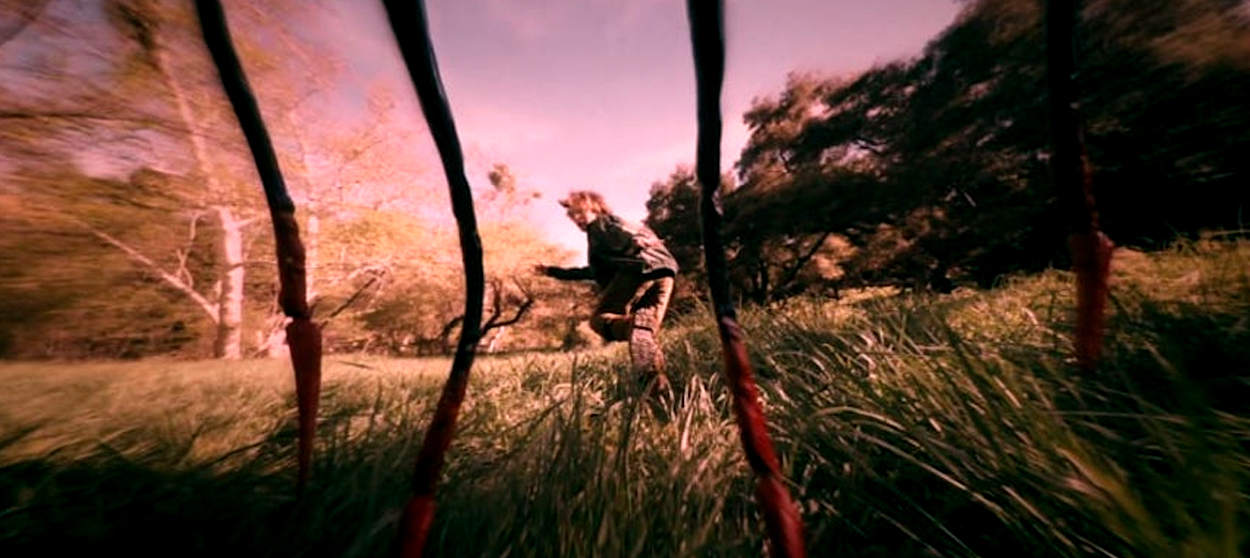Nightmare Cinema shows off the true range of the horror genre
Horror can be bleak and brutal, nihilistic to a fault, but it can be heart-wrenching, uproarious, unsettling, mournful, and just plain old weird


A free daily email with the biggest news stories of the day – and the best features from TheWeek.com
You are now subscribed
Your newsletter sign-up was successful
What defines a horror movie? Murder, perhaps, or monsters, whether human or inhuman; horror should stay with the viewer, get under their skin, or at least give them an adrenaline boost. The best answer to this question, simply put, is "fear." A horror movie has to be scary. Everything else is secondary.
But the new anthology horror film Nightmare Cinema shows the breadth of "everything else": Fear, certainly, but also humor, surrealism, gore, tragedy, melancholy, absurdism, and kink, contained across five shorts tied together with a wraparound narrative. That validation of horror's versatility has arrived at the perfect time; over the course of the 2010s, picking up momentum around 2014, horror has arguably become the decade's defining genre on the backs of critically feted classics-to-be like The Babadook, Get Out, The Witch, It Follows, Hereditary, and countless others, peaking with proliferation of that most unnecessary phrase: "elevated horror."
There's absolutely nothing elevated about Nightmare Cinema, and that's for the best. In "The Thing in the Woods," the movie's opener, director Alejandro Brugués (Juan of the Dead) plays with the slasher blueprint by fusing it with science fiction; Gremlins legend Joe Dante's "Mirari" tells a tale of plastic surgery gone wrong (or grotesquely right); Ryûhei Kitamura (The Midnight Meat Train, Versus) dives into demonic possession and 1980s Italian horror with "Mashit"; David Slade revisits the black and white scheme he put to use in Black Mirror's "Metalhead" with his contribution, "This Way to Egress," a rattling descent into madness taking after David Cronenberg; and Mick Garris sheds tears and spills buckets of blood with "Dead," the story of a hospitalized teen who discovers that he can see dead people. (Credit on the wraparound also goes to Garris.)
The Week
Escape your echo chamber. Get the facts behind the news, plus analysis from multiple perspectives.

Sign up for The Week's Free Newsletters
From our morning news briefing to a weekly Good News Newsletter, get the best of The Week delivered directly to your inbox.
From our morning news briefing to a weekly Good News Newsletter, get the best of The Week delivered directly to your inbox.
If there's one word to describe Nightmare Cinema, it's "excessive," yet the set-up is refreshingly straightforward. Late at night, characters wander one by one into a repertory theater run by the Projectionist (Mickey Rourke); one by one, they sit entranced before the screen as he plays terrifying short films for them, in which they play the leads. When each film ends, the cycle starts afresh with a new character. The Projectionist's purpose is obviously sinister, but are his movies glimpses of the future, reminders of sinful pasts, or just fictions to hold his doomed captive audience's attention? The answer doesn't matter. Diversity does, and Nightmare Cinema runs the full horror niche gamut. Whatever attracts people to the genre in the first place, it's found here.
Take "The Thing in the Woods," following the standardized slasher flick routine. Masked maniacs are a dime a dozen. They're such an intrinsic part of horror's DNA that even people who don't like slashers have seen their fair share. "The Thing in the Woods" starts with Samantha (Sarah Withers) fleeing over hill and dale from an assailant in a welder's mask; before long, she trips and falls flat on the carbonized corpse of a friend. Her jaw drops in disgust and terror. She tries to get up but loses her footing again and again, flailing over the body as danger closes in on her. It's revolting. It's also hilarious.
"The Thing in the Woods" gets away with sicko gags — including a beat where a clumsy cop trips and blows his head off with his own service weapon — exclusively because of its genre. This is the sort of material that's only comical when couched in the slasher's bad taste aesthetic (or a Coen brothers film). That thread resurfaces later in "Mashit," which has too much going on for its own good but rewards audiences with a sequence where a priest and a nun hack demonic kids to bits with swords. On paper, that's awful. In practice, the clip's slow-motion montage of severed limbs flying through the air on torrents of arterial spray plays as blackly funny.
Contrasted with Nightmare Cinema's other three pieces, "The Thing in the Woods" and "Mashit" are outliers. "Mirari," also bearing Tales From the Crypt's influence, is a twisted morality tale where vanity leads to shock at scalpel-point. "This Way to Egress," Nightmare Cinema's most visually distinct segment, opts for a less cartoonishly macabre approach and instead relies on atmospheric dread, captured through cinematographer Jo Willems' patient camerawork, as struggling mother Helen (Elisabeth Reaser) endures a mental breakdown in gray-scale. But this quartet delivers on horror's visceral promises. Despite their differences, they're not actually dissimilar.
A free daily email with the biggest news stories of the day – and the best features from TheWeek.com
On these grounds, "Dead" feels like Nightmare Cinema's standout. True, the film owes a debt to M. Night Shyamalan's The Sixth Sense (it's worth noting that The Sixth Sense's basic conceit crops up in movies like Lucio Fulci's Four of the Apocalypse, too), but "Dead" focuses on a literal choice between life and death. After seeing his parents gunned down before his very eyes, young piano prodigy Riley (Faly Rakotohavana) encounters his mother in his visions, encouraging him to join her and his father on the other side. In the land of the living, Riley is persuaded to stay by a fellow patient, Casey (Lexy Panterra), who shares his gift. All the while, he's stalked by his parents' killer and stuck between his will to live and his desire to see his mom and dad again. It's affecting work, surprisingly tender in ways that horror doesn't often allow itself to be. The fundamental question Garris poses in "Dead" is agonizing: If your loved ones died in front of you and you could pass on to reunite with them, would you go? Would you stay?
Nightmare Cinema isn't the first horror movie to raise powerful existential questions, or crack a joke, or perform ill-advised surgery. Nothing about it is groundbreaking. But horror doesn't need to break new ground to be valuable, and Nightmare Cinema's value is in its multifaceted quality. Horror can be bleak and brutal, nihilistic to a fault, but it can be heart-wrenching, uproarious, unsettling, mournful, and just plain old weird, too. The horror of the late 2010s is rich in variety, no mistaking it, but Nightmare Cinema encapsulates variety all on its own.
Bostonian culture journalist Andy Crump covers the movies, beer, music, and being a dad for way too many outlets, perhaps even yours: Paste Magazine, The Playlist, Mic, The Week, Hop Culture, and Inverse, plus others. You can follow him on Twitter and find his collected writing at his personal blog. He is composed of roughly 65 percent craft beer.
-
 The ‘ravenous’ demand for Cornish minerals
The ‘ravenous’ demand for Cornish mineralsUnder the Radar Growing need for critical minerals to power tech has intensified ‘appetite’ for lithium, which could be a ‘huge boon’ for local economy
-
 Why are election experts taking Trump’s midterm threats seriously?
Why are election experts taking Trump’s midterm threats seriously?IN THE SPOTLIGHT As the president muses about polling place deployments and a centralized electoral system aimed at one-party control, lawmakers are taking this administration at its word
-
 ‘Restaurateurs have become millionaires’
‘Restaurateurs have become millionaires’Instant Opinion Opinion, comment and editorials of the day
-
 Walter Isaacson's 'Elon Musk' can 'scarcely contain its subject'
Walter Isaacson's 'Elon Musk' can 'scarcely contain its subject'The latest biography on the elusive tech mogul is causing a stir among critics
-
 Welcome to the new TheWeek.com!
Welcome to the new TheWeek.com!The Explainer Please allow us to reintroduce ourselves
-
 The Oscars finale was a heartless disaster
The Oscars finale was a heartless disasterThe Explainer A calculated attempt at emotional manipulation goes very wrong
-
 Most awkward awards show ever?
Most awkward awards show ever?The Explainer The best, worst, and most shocking moments from a chaotic Golden Globes
-
 The possible silver lining to the Warner Bros. deal
The possible silver lining to the Warner Bros. dealThe Explainer Could what's terrible for theaters be good for creators?
-
 Jeffrey Wright is the new 'narrator voice'
Jeffrey Wright is the new 'narrator voice'The Explainer Move over, Sam Elliott and Morgan Freeman
-
 This week's literary events are the biggest award shows of 2020
This week's literary events are the biggest award shows of 2020feature So long, Oscar. Hello, Booker.
-
 What She Dies Tomorrow can teach us about our unshakable obsession with mortality
What She Dies Tomorrow can teach us about our unshakable obsession with mortalityThe Explainer This film isn't about the pandemic. But it can help viewers confront their fears about death.
